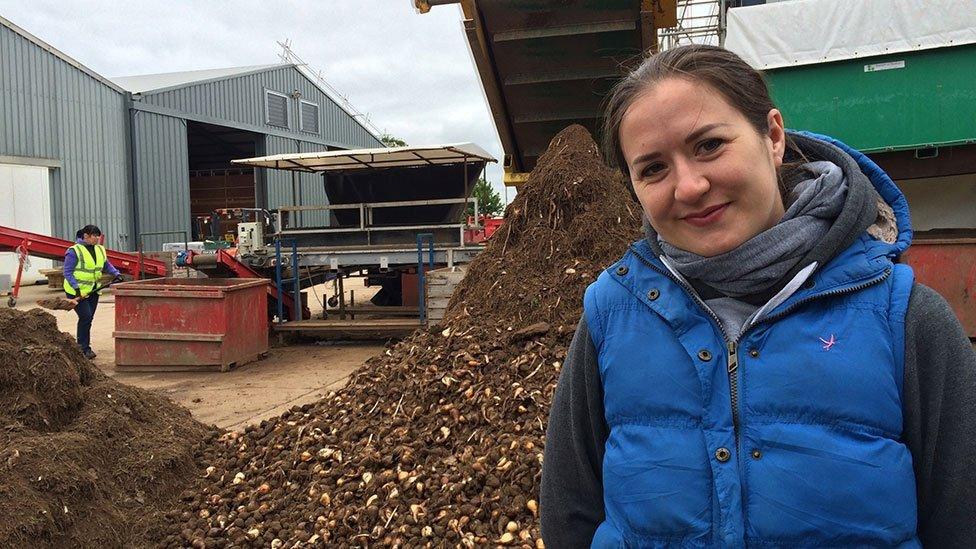UK net migration hits record high
- Published
What impact does immigration have on jobs and public services in the UK? Norman Smith reports
Net migration to the UK is at an all-time high, reaching 330,000 in the year to March, the Office for National Statistics has said.
The figure - the difference between the number entering the country and those leaving - is more than three times higher than the government's target.
Immigration Minister James Brokenshire called the rise "deeply disappointing".
Figures also show 8.3m people were born abroad - 13% of the UK population - the first time the number has passed 8m.
UKIP leader Nigel Farage said the "figures reflect 'Borderless Britain' and total impotence of the British government" and called on the prime minister to negotiate controls on migration from EU countries.
UK migration figures
330,000
Net migration to UK, in year ending March 2015
28%
Increase since March 2014
-
10,000 higher than previous peak in 2005
-
61% of EU immigrants who wanted work had definite jobs to go to
-
9,000 fewer people have emigrated since 2014
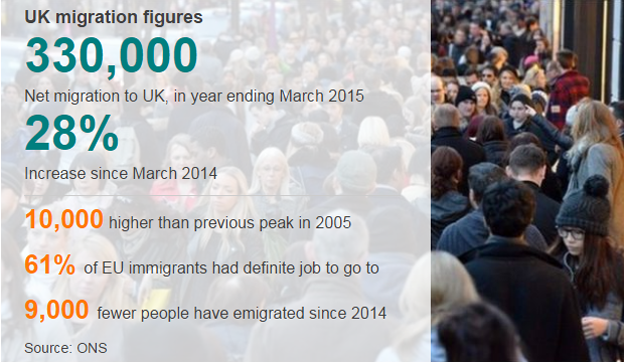
It is the fifth consecutive quarterly rise in the net migration figure - with increases in arrivals from both inside and outside the EU.
Net migration of EU citizens was 183,000, up 53,000 from the year ending March 2014.
The number of those arriving from countries outside the EU was still larger, with net migration measured at 196,000, up 39,000 on a year earlier.
Expansion of the EU and the relatively fast recovery of Britain's economy are seen as key factors in the trend.
About two-thirds of the EU migrants were said to be workers, and a fifth students. Among the migrants from outside the EU, about a half were students, a quarter workers, and one sixth family members.
Immigration Minister James Brokenshire MP says that reducing net migration is still an "ambition"
Among the other ONS findings, external based on the latest figures were:
Fewer people are leaving the UK, with emigration numbers dropping by 9,000 year-on-year
Other than EU countries, the nation with the highest number of citizens migrating to the UK in the 12 months to June was China, with 89,593 arrivals
India is the most common non-UK country of birth in the UK population - 793,000 UK residents were born in India
Polish is the most common non-British nationality, with 853,000 residents (including those born in the UK) describing their nationality as Polish
8.4% of UK residents - 5.3 million people - have a non-British nationality
53,000 Romanian and Bulgarian citizens moved to the UK in the last year - almost double the 28,000 in the previous 12 months
There were 25,771 asylum applications in the year to June 2015, an increase of 10% compared with the previous 12 months
A total of 11,600 people were granted asylum or an alternative form of protection. The peak was in 2002 when there were 84,000 applications, of which 28,400 people were allowed to stay in the UK
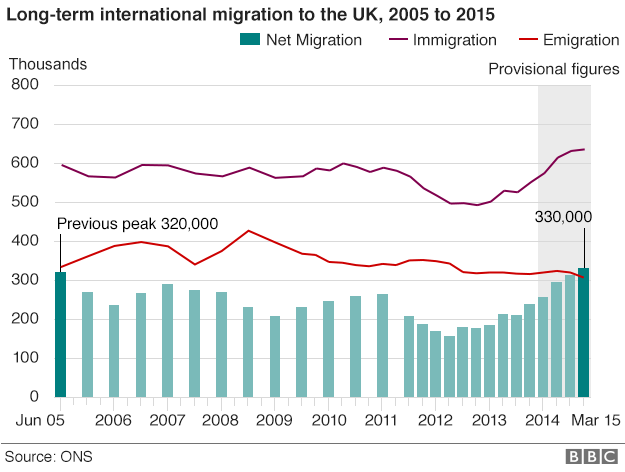
In 2011, Prime Minister David Cameron said in a speech that he was giving a "no ifs, no buts" promise that he would bring immigration numbers down to "levels our country can manage".
During the election campaign he reiterated this promise and said he would not "cave in" and abandon the target.
BBC's political correspondent Ross Hawkins said there were "lots of figures, but no cheer for a prime minister who promised he would reduce immigration to levels the country could manage".
"His ambition on migration is fast turning into a political embarrassment," he added.
UKIP leader Nigel Farage blames the EU for the increase in net migration
After the latest set of figures, the government insisted it was acting to control immigration but said the EU needed to do more to help ease the current migrant crisis across Europe.
Mr Brokenshire said that the "reliance that business continues to place on migrant labour" and students staying in the UK after they had finished their studies, were two potential reasons for the rise.
"Current flows of people across Europe are on a scale we haven't seen since the end of World War Two. This is not sustainable and risks the future economic development of other EU member states," he added.
'Morally wrong'
Yvette Cooper, Labour's shadow home secretary, said David Cameron "needs to stop the dishonesty over his failed immigration target".
She said: "All his overblown rhetoric has achieved is a decline in public confidence as the electorate are faced with more broken promises.
"But most troubling of all, the net migration target treats immigration and asylum as the same. That is morally wrong and is preventing Britain playing its part in responding to the terrible refugee crisis that stems from Syria and has spread across Europe.
The Institute of Directors and think tank British Future said Mr Cameron was "punishing businesses" by trying to fulfil promises to cut immigration.
Meanwhile, Jamil Dhanji an immigration barrister told the BBC's Victoria Derbyshire programme migrants were not coming to the UK to claim benefits.
"Migrants I see are not coming to this country for that reason," he said.
Earlier this week the government announced more details of its new Immigration Bill, which is due to be introduced in the autumn.
Under the legislation, illegal immigrants caught working in the UK could face up to six months in prison and late-night takeaways and off-licences will face closure if they are found employing foreigners who have no legal right to be in the country.
- Published27 August 2015
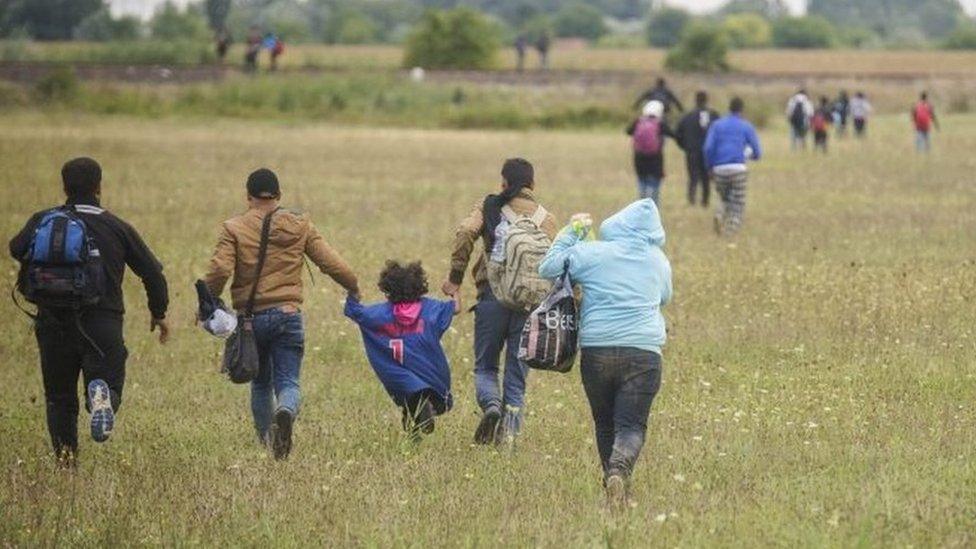
- Published27 August 2015
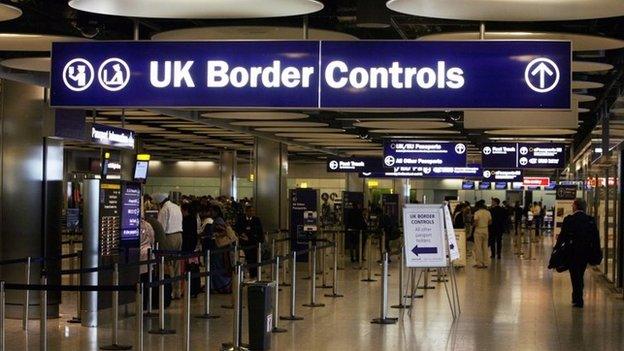
- Published27 August 2015
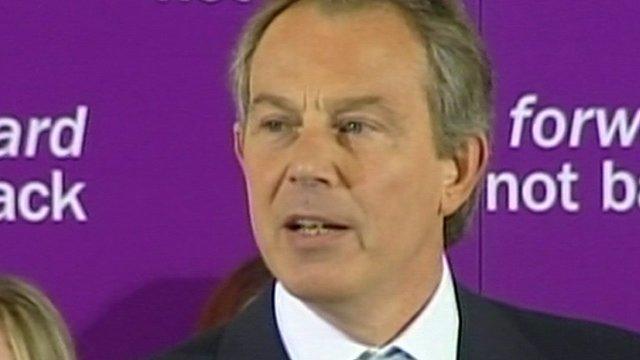
- Published21 May 2015
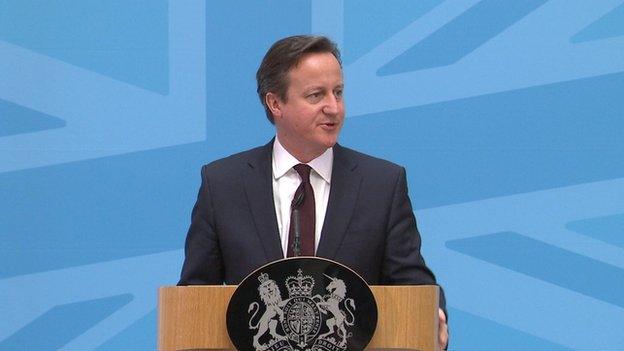
- Published25 June 2015
